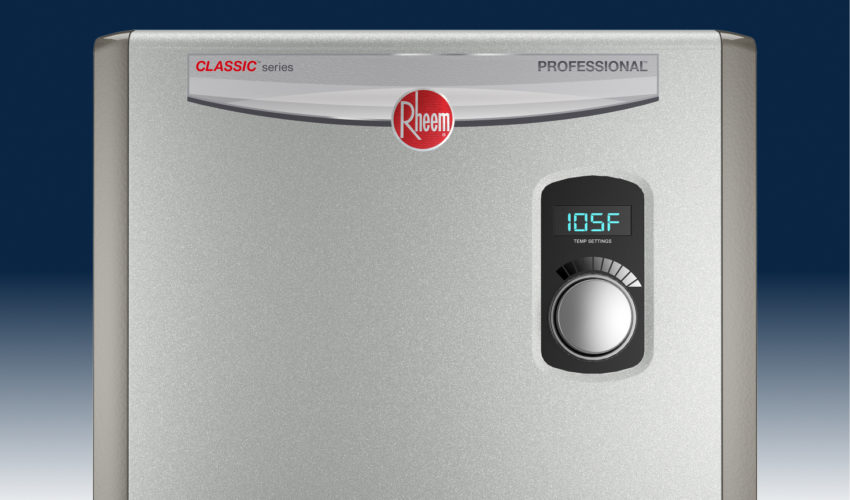Maybe you’ve come across them at your local hardware store, or perhaps a friend started telling you about the cost savings and compact size of their new tankless water heater. If you’ve ever wondered what they are, why they’re different, and whether they’re worth the high initial cost — we’ve got you covered.
What are tankless water heaters?
Most Americans are used to a huge water heater that stores your property’s heated water in a large tank. If you’ve seen a tankless water heater, you might be perplexed and intrigued by this seemingly new technology. In fact, tankless water heaters are very common in Europe and South America and have been successfully used for years in other countries.
Conventional water heaters consistently store 40 or more gallons of hot water in a large tank, whereas tankless water heaters function by heating water when a hot water faucet is turned on. Instead of maintaining and heating a large reserve of hot water, tankless water heaters only heat water when you need it. This results in a continuous supply of hot water rather than a finite tank of pre-heated water.
What are the benefits of a tankless water heater?
We at North East Air Conditioning and Plumbing regularly get asked about the benefits of tankless water heaters. Here’s what we tell our customers.
Tankless water heaters are more energy efficient
It’s true that these “on-demand” water heaters are usually more energy efficient compared to our traditional water heaters. Because these only heat water as it is being used rather than constantly storing upwards of 40-50 gallons in a tank, ultimately tankless water heaters require fewer energy resources to create and maintain that hot water. This is where you’ll realize those cost-savings in the long-term, plus reduce your environmental footprint.
Tankless water heaters can reduce your flooding risk
Because you won’t be storing upwards of 50 gallons of water in a traditional hot water tank, you can reduce your risk for conventional hot water tank flooding thanks to a ruptured tank. Keep in mind that tankless water heaters can still lead to flooding issues, but are less commonly damaged.
Tankless water heaters have a longer operating life
Most tankless water heaters have a lifespan of 15-20 years if properly maintained. Conventional water heaters tend to last about 10 years on average. That reduction in equipment costs and turnover can not only be convenient, but also incredibly cost-effective as well.
What else do I need to consider before buying a tankless water heater?
Tankless water heaters have a high initial cost
The sticker shock of the hardware can turn many potential buyers off when evaluating whether to buy a tankless water heater. You’ll also need to contact a professional to install your new water heater, which can increase your initial investment a bit. Keep in mind that the potential energy savings you’ll realize for these types of water heaters help offset that initial cost over a period of years.
Tankless water heaters take longer to deliver hot water
Though they can supply an endless amount of hot water, tankless water heaters don’t have an initial reservoir of hot water ready and waiting — this is a function of those energy savings we mentioned above. You’ll have to wait a little longer for the equipment to heat the water as you turn it on.
Hard water can take a toll on tankless water heaters
One major consideration for residents of San Antonio and Central Texas is the type of water that will be flowing through this system. Most of us get our water from the Edwards Aquifer, which contains limestone that leaves us with very hard water. If you don’t have a water softener system in place, you’ll likely see a reduced lifespan for your tankless water heater. You’ll also likely need more regular maintenance cleaning out those pesky mineral deposits.
If you’re thinking about a tankless water heater, let us help.
Give us a call before making that investment and we can help you figure out what size you’ll need and how complicated the installation might be. North East has decades of plumbing experience and can help you make the right choice for your property.


